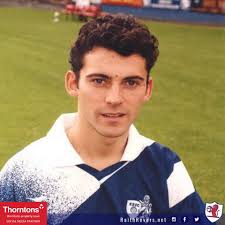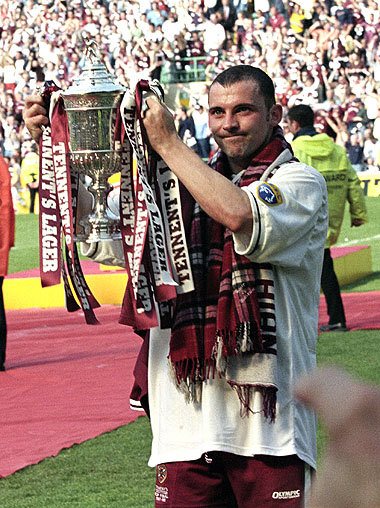Colin Cameron was part of the most famous Raith Rovers side in the 1990s and enjoyed a decent career in both Scotland and England.
Not many fans will know that Raith qualified for Europe after winning the 1994-95 League Cup and played against German giants Bayern Munich. Cameron first joined Raith Rovers as a youngster but had to make his way in the professional game on loan at Sligo Rovers. This was a successful spell as he scored 4 times.

On his return he became a regular in the Rovers side and helped the team defeat Celtic in the League Cup final which set up the tie with Bayern Munich.. There weren’t many more ups in his time at the club as the team were relegated twice and after 152 league appearances and 32 goals he left for Hearts.
Once again his biggest achievement at the club was winning the Scottish Cup. This time he scored in the 1998 final against Rangers which Hearts won. In his five years at the club he played over 150 games and gained a good reputation.

In 2001, Wolves signed him for £1.75 million and became a favourite due to his hardworking displays. He wasn’t a regular goalscorer but some of his goals were important, including the goal that gave them their first ever win in the top flight. He was also loved by the fans because every time he scored his side avoided defeat. Cameron was first choice for the club until Glenn Hoddle took charge and was loaned out to Millwall much to the fans dismay.

Upon not getting a new contract he signed with Coventry City. An injury ruined his season and only played two games after Christmas. He was not given a new contract and was signed by former teammate Paul Ince at MK Dons. His experience and knowledge helped the club win the League Two title and The Football League trophy.
But after just one season he was looking for a new club returning to Scotland, signing for Dundee, joining up with another former teammate in Alex Rae. His time at the club was a disaster as more injuries flared up and despite a loan spell at Arbroath to regain his fitness he could never get back to his best.
Cowdenbeath gave him a chance to start his coaching career as well as continuing his playing career. After just one season he was promoted from assistant manager to manager and led the team to the Second Division title. But after managing over 100 games he left the club by mutual consent in November 2013. Six months later he became the player manager of Berwick Rangers, despite having a similar winning percentage he could not get the same success and left in October 2015.
The final word can go to former Wolves manager Dave Jones, “I’ve been watching Colin for some time. He has a big reputation and with his armoury the club has signed one hell of a player.”






